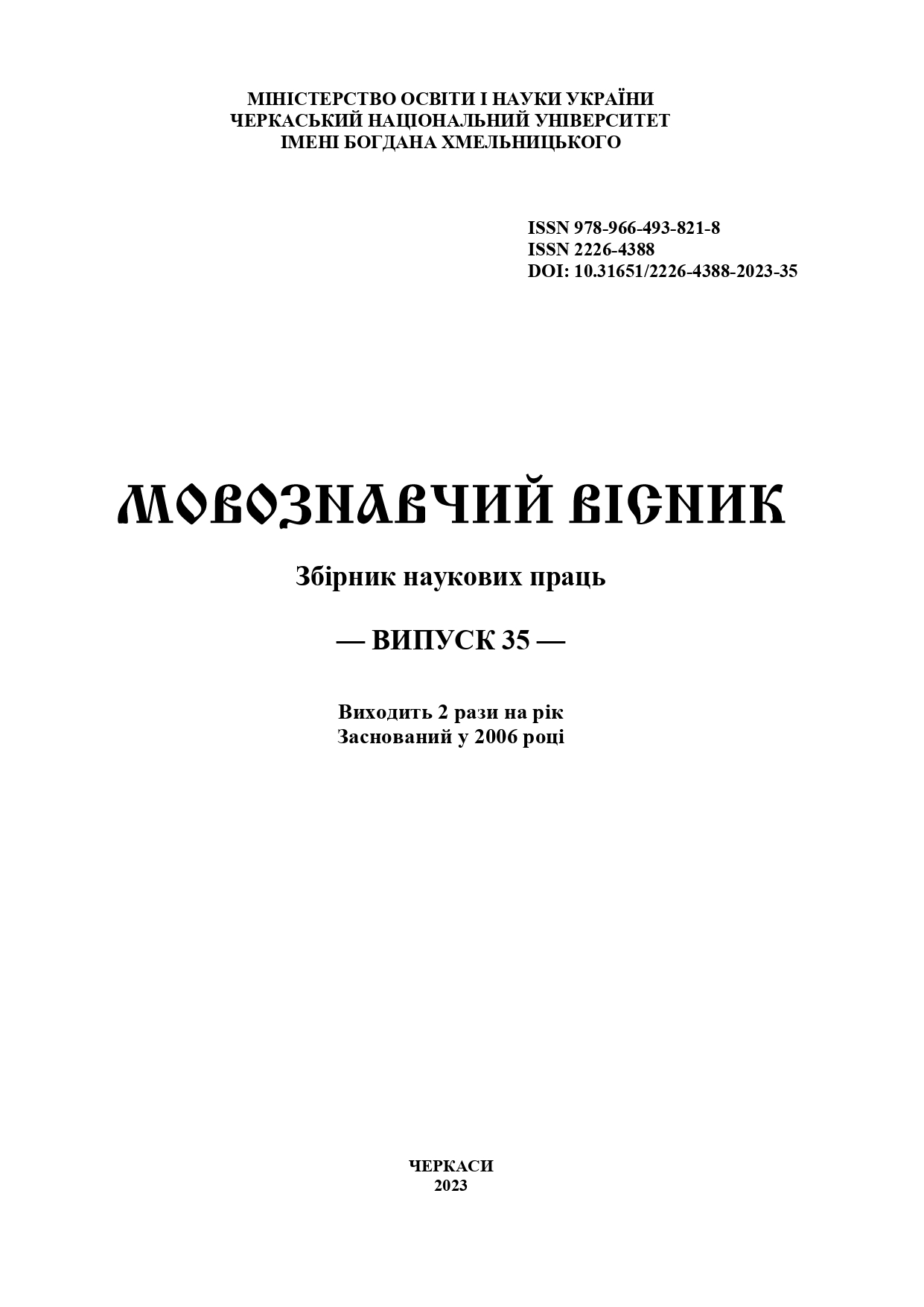THE WAR IN THE LANGUAGE AND IN THE LANGUAGE ACTIVITIES OF THE UKRAINIANS
Main Article Content
Abstract
Introduction. This paper explores the profound impact of the Russo-Ukrainian war on communication and the Ukrainian language system. Notable societal events are reflected in language, affecting both communication and the structure of the language itself by introducing new words, meanings, and expressions.
The purpose. This study aims to describe ongoing linguistic changes in the context of warfare and to analyze the impact of the Russo-Ukrainian war on the linguistic activities of the Ukrainian community and the Ukrainian language system.
The methods. The research framework draws on Karl Gutschmidt's theory of innovative linguistic processes and synchronous dynamics, supplemented by insights from Ukrainian linguists, particularly focusing on the systematic analysis of newly introduced vocabulary in terms of form, meaning, and function. The study analyzes materials from 2022 to early 2023, including texts from electronic Ukrainian media, Telegram news channels, prose, poetry, and social media posts.
Main results of the study. The examination of linguistic output from the Ukrainian community reveals several key findings: 1) the challenge of verbalizing the psychological trauma endured by Ukrainians during the war; 2) the use of culture, history, and imagery to reaffirm national identity and cope with trauma; 3) the increased use of humor as a defense mechanism during times of existential threat. Additionally, the analysis highlights the complex interplay between language internationalization and nationalization during wartime, with internationalization influenced by Western pop culture and nationalization involving the revival of Ukrainian traditions and humor culture, all contributing to Ukrainian identity.
Originality. The authors point out that an important development in the contemporary linguistic landscape during wartime is the shift towards exporting Ukrainian words and concepts to the Englishspeaking world, which this study aims to explore.
Conclusions and specific suggestions of the authors. The impact of war on the Ukrainian language system is manifested through active processes of vocabulary reorganization and the activation of certain language developments. As a result of the war, the functional potential of some words in the Ukrainian language undergoes changes, with certain words moving from the periphery of the language system to the center due to centripetal forces. These new linguistic phenomena require careful description, documentation, and analysis, particularly regarding the appropriateness of their representation in lexicographical sources.
Article Details
References
Гриценко С. Мовні інновації російсько-української війни 2022 року. Літературознавство.
Мовознавство. Фольклористика. 2022. № 2(32). С. 9–13.
Гутшмидт К. Общие тенденции и специфические формы их представления в современных
славянских языках. Jazykovedný časopis. 1998. № 49/1–2. S. 15–26.
Кислюк Л. П. Сучасна українська словотвірна номінація: ресурси та тенденції розвитку:
(монографія). Київ : Ін-т укр. мови НАН України ; Вид. дім Дмитра Бураго, 2017. 424 с.
Карпіловська Є. А., Кислюк Л. П., Клименко Н. Ф., Критська В. І., Пуздирєва Т. К., Романюк
Ю. В. Вплив суспільних змін на розвиток української мови / Відп. ред. Є. А. Карпіловська. Київ : Ін-т укр.
мови НАН України; Вид. дім Дмитра Бураго, 2017. 444 с.
Клименко Н. Ф., Карпіловська Є. А., Кислюк Л. П. Динамічні процеси в сучасному українському
лексиконі. Київ : Видавничий дім Дмитра Бураго, 2008. 336 с.
Сюта Г. М. Лінгвософія опозицій «свій – чужий» у текстах періоду російсько-української війни.
Українська мова. 2023. 2 (86). С. 3–34. URL : https://doi,org/10.15407/ukrmova2023.02.003.
Słowotwόrstwo / Nominacja / Red. nauk. I. Ohnheiser. Innsbruck : Univer. Innsbruck; Opole : Uniwer.
Opolski, 2003. 568 с.

